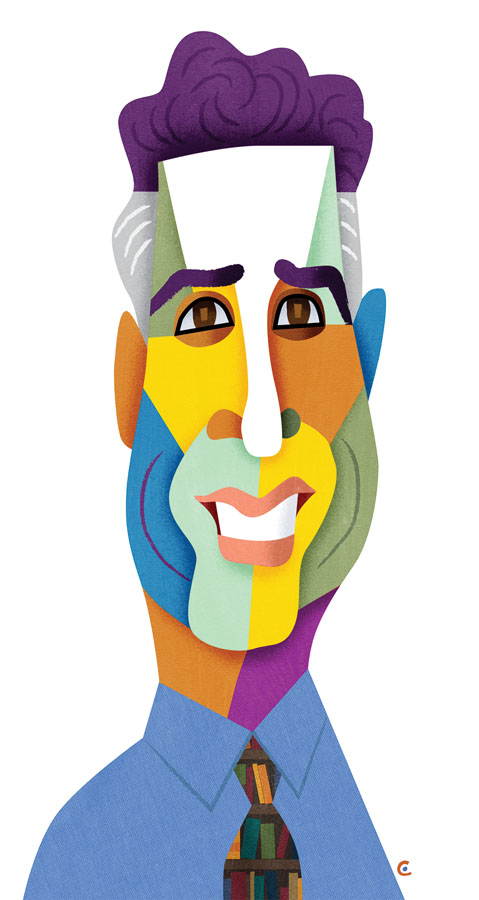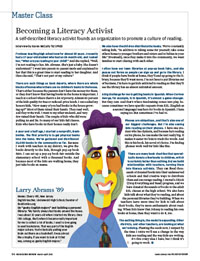Master Class
 (Photo: David Cowles for Rochester Review)
(Photo: David Cowles for Rochester Review)Larry Abrams ’89
Home: Cherry Hill, New Jersey
English teacher, Lindenwold High School; founder of BookSmiles.org
On “geeky English majors” and building a personal library: “My family always had books around the house. I was about 10 years old when I started my library. Once I hit college, that’s when it became really important for me to collect a lot of books. I used to love going to used bookstores. That was part of the English major culture. You’re basically putting your brain out there on a bookshelf. It was almost like a trophy, if you want to look at it that way, among us geeky English majors.”
I’ve been teaching high school now for almost 20 years. I recently had a 17-year-old student who had an 18-month-old, and I asked her, “What are you reading to your child?” And she replied, “Well, I’m not reading to her, Mr. Abrams. She’s just a baby. She doesn’t understand.” I went into parent-to-parent mode and explained to her that this is a great time to start reading to her daughter. And then she said, “That’s not part of my culture.”
There are such things as book deserts, where there are whole blocks of homes where there are no children’s books in the house. That’s either because the parents don’t have the money for them, or they don’t know that having books in the home is important. I teach at a school where there’s a lot of poverty. Almost 80 percent of the kids qualify for free or reduced-price lunch. I once asked my honors kids, “How many of you had books in the house growing up?” Most of them raised their hands. They read well, and they write well. I went to my other students, and very few raised their hands. The couple of kids who did were pulling As and Bs. So many of our kids fail classes. Kids who have books in their homes really don’t.
A year and a half ago, I started a nonprofit, BookSmiles. The first priority is to get physical books into the home. We’ve gathered and distributed 35,000 books in the community so far. Because I work with teachers in my district, we give the books directly to the kids, through pop-up book fairs. I can set up a pop-up book fair outside the elementary school with a thousand books. And because most of the kids are walking home, they just take books en masse.
We also have the children distribute the books. We’re constantly telling kids, “In addition to taking some for yourself, take some others home to younger brothers and sisters and to babies in your life.” Eventually, once they make it into the community, we want families to start sharing with each other.
I often have our town librarian at pop-up book fairs, and she passes out forms so people can sign up and go to the library. I think if people have books at home, they’ll end up going to the library, because they’ll want more. I’m not here to put libraries out of business, I’m here to get kids addicted to reading so that they’ll see the library has an almost unlimited amount.
A big challenge for me is getting books in Spanish. When Curious George, for example, is in Spanish, it’s almost a game-changer. But they cost. And that’s where fundraising comes into play, because sometimes we have specific requests from ESL (English as a second language) teachers for books in Spanish. I hate saying no. But sometimes I’ve had to.
Phones are ubiquitous, and that’s also one of our biggest challenges. But I’m also seeing kids reading on their phones. I have one student who has dyslexia, and because he’s reading on his phone, he can make the text really big. It makes it easier for him to track the words. And this is his book, his novel of choice. I’m finding phones work well for kids like this.
There are many book charities that sporadically donate a few books to children, which is certainly better than nothing. But we build relationships with teachers, turning them into literacy activists. They can flood thousands of donated books into their underserved schools and find creative ways to distribute them and encourage reading. I started a DEAR (Drop Everything and Read) program, and we have donated thousands of books to the adult ESL classes at the high school. We also have kids talk about what they’re reading, and about the personal libraries they’re building. When we teachers leave more time for kids to talk about their books, they’re more enthusiastic about reading. When kids know that Johnny is reading his own books at home, then they want to do it, too.
The exciting thing is, the model is expanding. Other districts, and other teachers, are looking at what we’re doing. Planting the seeds now, I suspect by the time I retire we’ll see a change in the way kids are reading and the way kids are writing. It’s this crazy idea I have, but I think it’s going to work.

